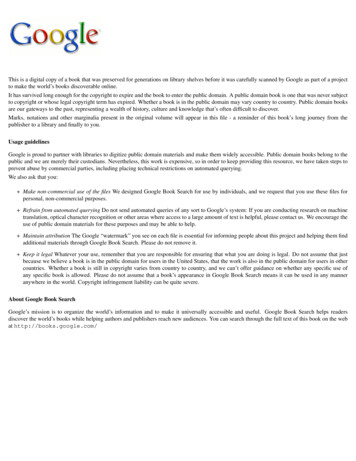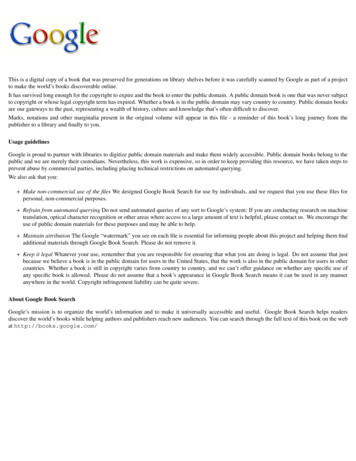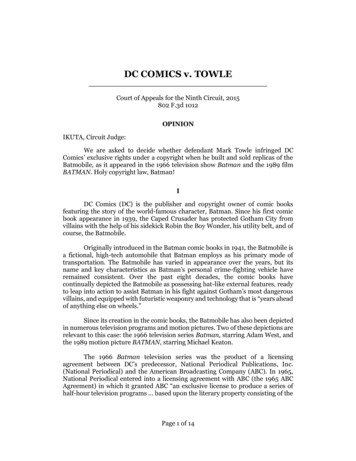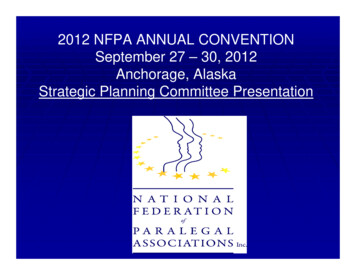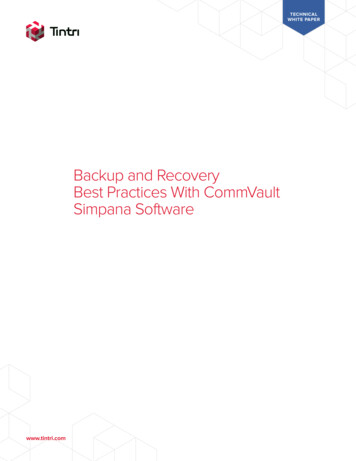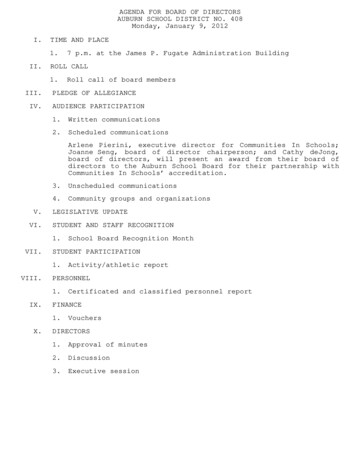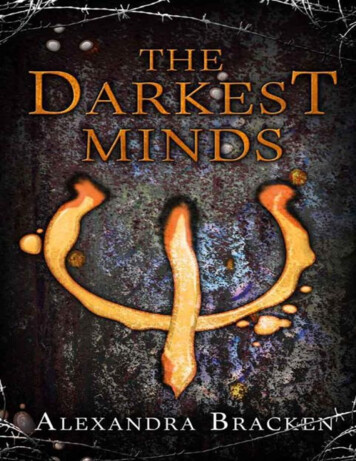
Transcription
Copyright 2012 by Alexandra BrackenAll rights reserved. Published by Hyperion, an imprint of Disney Book Group.No part of this book may be reproduced or transmitted in any form or by anymeans, electronic or mechanical, including photocopying, recording, or by anyinformation storage and retrieval system, without written permission from thepublisher. For information address Hyperion, 114 Fifth Avenue, New York,New York 10011-5690.ISBN 978-1-4231-7918-4Visit www.un-requiredreading.com
ContentsTitle irty-oneAcknowledgments
For Stephanie and Daniel,who were in every minivan with me
PROLOGUEWHEN THE WHITE NOISE WENT OFF, we were in the Garden, pulling weeds.I always reacted badly to it. It didn’t matter if I was outside, eating in theMess Hall, or locked in my cabin. When it came, the shrieking tones blew uplike a pipe bomb between my ears. Other girls at Thurmond could pickthemselves up after a few minutes, shaking off the nausea and disorientation likethe loose grass clinging to their camp uniforms. But me? Hours would passbefore I was able to piece myself back together.This time should have been no different.But it was.I didn’t see what had happened to provoke the punishment. We wereworking so close to the camp’s electric fence that I could smell the singed airand feel the voltage it shed vibrating in my teeth. Maybe someone got brave anddecided to step out of the Garden’s bounds. Or maybe, dreaming big, someonefulfilled all our fantasies and threw a rock at the head of the nearest Psi SpecialForces soldier. That would have been worth it.The only thing I knew for certain was that the overhead speakers spurtedout two warning blares: one short, one long. The skin on my neck crawled as Ileaned forward into the damp dirt, hands pressed tightly against my ears,shoulders tensed to take the hit.The sound that came over the speakers wasn’t really white noise. It wasn’tthat weird buzz that the air sometimes takes on when you’re sitting alone insilence, or the faint hum of a computer monitor. To the United States governmentand its Department of Psi Youth, it was the lovechild of a car alarm and a dentaldrill, turned up high enough to make your ears bleed.Literally.The sound ripped out of the speakers and shredded every nerve in my body.It forced its way past my hands, roaring over the screams of a hundred teenagefreaks, and settled at the center of my brain, where I couldn’t reach in and rip itout.
My eyes flooded with tears. I tried to ram my face into the ground—all Icould taste in my mouth was blood and dirt. A girl fell forward next to me, hermouth open in a cry I couldn’t hear. Everything else faded out of focus.My body shook in time with the bursts of static, curling in on itself like anold, yellowing piece of paper. Someone’s hands were shaking my shoulders; Iheard someone say my name—Ruby—but I was too far gone to respond. Gone,gone, gone, sinking until there was nothing, like the earth had swallowed me upin a single, deep breath. Then darkness.And silence.
ONEGRACE SOMERFIELD WAS THE FIRST TO DIE.The first in my fourth grade class, at least. I’m sure that by then, thousands,maybe even hundreds of thousands, of kids had already up and gone the sameway she had. People were slow to piece it all together—or, at least, they hadfigured out the right way to keep us in the dark long after kids started dying.When the deaths finally came to light, my elementary school put a strict banon teachers and staff talking to us about what was then called Everhart’s Disease,after Michael Everhart, the first kid known to have died of it. Soon, someonesomewhere decided to give it a proper name: Idiopathic Adolescent AcuteNeurodegeneration—IAAN for short. And then it wasn’t just Michael’s disease.It was all of ours.All the adults I knew buried the knowledge beneath lying smiles and hugs. Iwas still stuck in my own world of sunshine, ponies, and my race car collection.Looking back, I couldn’t believe how naive I was, just how many clues I missed.Even big things like when my dad, a cop, started working longer hours and couldbarely stand to look at me when he finally did come home. My mom started meon a strict vitamin regimen and refused to let me be alone, even for a fewminutes.On the other hand, my parents were both only children. I didn’t have anydead cousins to send up red flags, and my mom’s refusal to let my dad install a“soul-sucking vortex of trash and mindless entertainment”—that thingcommonly known as a television—meant that no scary news broadcasts rockedmy world. This, combined with the CIA-grade parental controls set up on ourInternet access, pretty much ensured I’d be far more concerned with how mystuffed animals were arranged on my bed than the possibility of dying before mytenth birthday.I was also completely unprepared for what happened on the fifteenth ofSeptember.It had rained the night before, so my parents sent me to school wearing red
galoshes. In class, we talked about dinosaurs and practiced cursive before Mrs.Port dismissed us for lunch with her usual look of relief.I remember every detail of lunch that day clearly, not because I was sittingacross from Grace at the table, but because she was the first, and because itwasn’t supposed to happen. She wasn’t old like Grandpops had been. She didn’thave cancer like Mom’s friend Sara. No allergies, no cough, no head injury—nothing. When she died, it came completely out of the blue, and none of usunderstood what it meant until it was too late.Grace was locked in deep debate about whether a fly was trapped inside herJell-O cup. The red mass shivered as she waved it around, inching out over theedge of the container when she squeezed it a bit too tight. Naturally, everyonewanted to give their opinion on whether it was a fly or a piece of candy Gracehad pushed in there. Including me.“I’m not a liar,” Grace said. “I just—”She stopped. The plastic cup slipped from her fingers, hitting the table. Hermouth was open, eyes fixed on something just beyond my head. Grace’s browwas furrowed, almost as if she was listening to someone explain something verydifficult.“Grace?” I remember saying. “Are you okay?”Her eyes rolled back, flashing white in the second it took for her eyelids todroop down. Grace let out a small sigh, not even strong enough to blow away thestrands of brown hair stuck to her lips.All of us sitting nearby froze, though we must have had the same exactthought: she’s fainted. A week or two before, Josh Preston had passed out on theplayground because, as Mrs. Port explained, he didn’t have enough sugar in hissystem—something stupid like that.A noon aide rushed over to the table. She was one of four old ladies withwhite visors and whistles who rotated lunch and playground duty during theweek. I have no idea if she had any medical certifications beyond a vague notionof CPR, but she pulled Grace’s sagging body to the ground all the same.She had a rapt audience as she pressed her ear to Grace’s hot pink T-shirt,listening for a heartbeat that wasn’t there. I don’t know what the old ladythought, but she started yelling, and suddenly white visors and curious facescircled in on us. It wasn’t until Ben Cho nudged Grace’s limp hand with hissneaker that any of us realized she was dead.The other kids started screaming. One girl, Tess, was crying so hard she
couldn’t breathe. Small feet stampeded toward the cafeteria door.I just sat, surrounded by abandoned lunches, staring at the cup of Jell-O andletting terror crawl through me until my arms and legs felt like they would befrozen to the table forever. If the school’s security officer hadn’t come andcarried me outside, I don’t know how long I would’ve stayed there.Grace is dead, I was thinking. Grace is dead? Grace is dead.And it got worse.A month later, after the first big waves of deaths, the Centers for DiseaseControl and Prevention released a five-step list of symptoms to help parentsidentify whether their kid was at risk for IAAN. By then half my class was dead.My mom hid the list so well that I only found it by accident, when Iclimbed on top of the kitchen counter to look for the chocolate she kept hiddenbehind her baking supplies.HOW TO IDENTIFY IF YOUR CHILD IS AT RISK, the flyer read. I recognized theflaming orange shade of the paper: it was the sheet Mrs. Port had sent home withher few remaining students days before. She had folded it twice and fastened itwith three staples to prevent our reading it. TO THE PARENTS OF RUBY ONLY waswritten on the outside and underlined three times. Three times was serious. Myparents would have grounded me for opening it.Luckily for me, it was already open.1. Your child suddenly becomes sullen and withdrawn, and/or loses interest inactivities they previously enjoyed.2. S/he begins to have abnormal difficulty in concentrating or suddenlybecomes hyper-focused on tasks, resulting in s/he losing track of timeand/or neglecting him/herself or others.3. S/he experiences hallucinations, vomiting, chronic migraines, memory loss,and/or fainting spells.4. S/he becomes prone to violent outbursts, unusually reckless behavior, orself-injury (burns, bruising, and cuts that cannot be explained).5. S/he develops behaviors or abilities that are inexplicable, dangerous, orcause you or others physical harm.IF YOUR CHILD DEMONSTRATES ANY OF THE ABOVESYMPTOMS, REGISTER HIM/HER AT IAAN.GOV AND WAIT TO BECONTACTED ABOUT THE LOCAL HOSPITAL TO WHICH S/HESHOULD BE TAKEN.
When I finished reading the flyer, I folded it back up neatly, put it exactlywhere I found it, and threw up in the sink.Grams phoned later that week, and in her usual to-the-point-Grams wayexplained everything to me. Kids were dying left and right, all about my age.But the doctors were working on it, and I wasn’t supposed to be afraid, because Iwas her granddaughter, and I would be fine. I should be good and tell my parentsif I felt anything weird, understand?Things turned from bad to terrifying very fast. A week after three of thefour kids in my neighborhood were buried, the president made a formal addressto the nation. Mom and Dad watched the live stream on the computer, and Ilistened from outside the office door.“My fellow Americans,” President Gray began. “Today we face adevastating crisis, one that threatens not only our children’s lives, but the veryfuture of our great nation. May it comfort you to know that in our time of need,we in Washington are developing programs, both to support the families affectedby this horrid affliction and the children blessed enough to survive it.”I wish I could have seen his face as he spoke, because I think he knew—hemust have—that this threat, the crimp in our supposedly glorious future, hadnothing to do with the kids who had died. Buried underground or burned intoash, they couldn’t do anything but haunt the memories of the people who hadloved them. They were gone. Forever.And that symptoms list, the one that was sent home folded and stapled byteachers, which was aired a hundred times over on the news as the faces of thedead scrolled along the bottom of the screen? The government was never scaredof the kids who might die, or the empty spaces they would leave behind.They were afraid of us—the ones who lived.
TWOIT RAINED THE DAY they brought us to Thurmond, and it went on to rain straightthrough the week, and the week after that. Freezing rain, the kind that wouldhave been snow if it had been five degrees colder. I remember watching thedrops trace frantic paths down the length of the school bus window. If I had beenback at home, inside one of my parents’ cars, I would have followed the drops’swerving routes across the cold glass with my fingertips. Now, my hands weretied together behind my back, and the men in the black uniforms had packedfour of us to a seat. There was barely room to breathe.The heat from a hundred-odd bodies fogged the bus windows, and it actedlike a screen to the outside world. Later, the windows of the bright yellow busesthey used to bring kids in would be smeared with black paint. They just hadn’tthought of it yet.I was closest to the window on the five-hour drive, so I could make outslivers of the passing landscape whenever the rain let up for a bit. It all lookedexactly the same to me—green farms, thick expanses of trees. We could havestill been in Virginia, for all I knew. The girl sitting next to me, the one thatwould later be classified Blue, seemed to recognize a sign at one point becauseshe leaned over me to get a better look. She looked a little familiar to me, like Ihad seen her face from around my town, or she was from the next one over. Ithink all of the kids with me were from Virginia, but there was no way to besure, because there was only one big rule: and that was Silence.After they had picked me up from my house the day before, they’d kept me,along with the rest of the kids, in some kind of warehouse overnight. The roomwas washed in unnatural brightness; they sat us in a cluster on the dirty cementfloor, and pointed three floodlights toward us. We weren’t allowed to sleep. Myeyes were watering so badly from the dust that I couldn’t see the clammy, palefaces around me, let alone the faces of the soldiers who stood just beyond thering of lights, watching. In some weird way, they ceased to be whole men andwomen. In the gray haze of half sleep, I processed them in small, terrifyingpieces: the gasoline reek of shoe polish, the creak of stiff leather, the twist of
disgust on their lips. The tip of a boot as it dug into my side, forcing me backawake.The next morning, the drive was completely silent except for the soldiers’radios and the kids that were crying toward the back of the bus. The kid sitting atthe other end of our seat wet his pants, but he wasn’t about to tell that to the redhaired PSF standing beside him. She had slapped him when he complained hehadn’t eaten anything all day.I flexed my bare feet against the ground, trying to keep my legs still.Hunger was making my head feel funny, too, bubbling up every once in a whileto overwhelm even the spikes of terror shooting through me. It was hard tofocus, and harder to sit still; I felt like I was shrinking, trying to fade back intothe seat and disappear completely. My hands were starting to lose feeling afterbeing bound in the same position for so long. Trying to stretch the plastic bandthey’d tightened around them did nothing but force it to cut deeper into the softskin there.Psi Special Forces—that’s what the driver of the bus had called himself andthe others when they collected us from the warehouse. You are to come with uson authority of the Psi Special Forces commander, Joseph Traylor. He held up apaper to prove it, so I guess it was true. I had been taught not to argue withadults, anyway.The bus took a deep dip as it pulled off the narrow road and onto a smallerdirt one. The new vibrations woke whoever had been lucky or exhausted enoughto fall asleep. They also sent the black uniforms into action. The men andwomen stood straighter, and their attention snapped toward the windshield.I saw the towering fence first. The darkening gray sky cast everything in amoody, deep blue, but not the fence. It was glowing silver as the wind whistledthrough its open pockets. Just below my window were dozens of men andwomen in full uniform, escorting the bus in at a brisk jog. The PSFs in thecontrol booth at the gate stood and saluted the driver as he navigated past them.The bus lurched to a stop, and we were all forced to stay deathly still as thecamp gate slid shut behind us. The locks cracked through the silence like thunderas they came together again. We were not the first bus through—that had come ayear before. We were not the last bus, either. That would come in three moreyears, when the camp’s occupancy maxed out.There was a single breath of stillness before a soldier in a black rain ponchorapped on the bus door. The driver reached over and pulled the lever—and endedanyone’s hope that this was a short pit stop.
The PSF was an enormous man, the kind you’d expect to play an evil giantin a movie, or a villain in a cartoon. He kept his hood up, masking his face, hair,and anything that would have let me recognize him later. I guess it didn’t matter.He wasn’t speaking for himself. He was speaking for the camp.“You will stand and exit the bus in an orderly fashion,” he yelled. Thedriver tried to hand him the microphone, but the soldier knocked it away with hishand. “You will be divided into groups of ten, and you will be brought in fortesting. Do not try to run. Do not speak. Do not do anything other than what isasked of you. Failure to follow these instructions will be met with punishment.”At ten, I was one of the younger kids on the bus, though there werecertainly a few kids younger. Most seemed to be twelve, even thirteen. The hateand mistrust burning in the soldiers’ eyes might have shrunken my spine, but itonly sparked rebellion in the older kids.“Go screw yourself!” someone yelled from the back of the bus.We all turned at once, just in time to see the PSF with the flaming red hairlaunch the butt of her rifle into the teenage boy’s mouth. He let out a shriek ofpain and surprise as the soldier did it again, and I saw a faint spray of blood burstfrom his mouth when he took his next, angry breath. With his hands behind hisback, there was no way he could block the attack. He just had to take it.They began moving kids off the bus, one seat of four at a time. But I wasstill watching that kid, the way he seemed to cloud the air around him withsilent, toxic fury. I don’t know if he felt me staring, or what, but the boy turnedaround and met my gaze. He nodded at me, like an encouragement. And whenhe smiled, it was around a mouthful of bloody teeth.I felt myself being hauled up and out of my seat, and almost before Irealized what was happening, I was slipping down the wet bus steps andtumbling into the pouring rain. A different PSF lifted me off my knees andguided me in the direction of two other girls about my age. Their clothes clungto them like old skin, translucent and drooping.There were nearly twenty PSFs on the ground, swarming the neat smalllines of kids. My feet had been completely swallowed by the mud, and I wasshivering in my pajamas, but no one took notice, and no one came up to cut theplastic binding our hands. We waited, silently, tongues clamped between ourteeth. I looked up to the clouds, turning my face to the pounding rain. It lookedlike the sky was falling, piece by piece.The last groups of four were being lifted off the bus and dropped onto theground, including the boy with the broken face. He was the last one off, just
behind a tall blond girl with a blank stare. I could barely make them out throughthe sheet of rain and the foggy bus windows, but I was sure I saw the boy leanforward and whisper something into the girl’s ear, just as she took the first stepoff the bus.She nodded, a quick jerk of her chin. The second her shoes touched themud, she bolted to the right, ducking around the nearest PSF’s hands. One of thePSFs barked out a terrifying “Stop!” but she kept running, straight for the gates.With everyone’s attention turned toward her, no one thought to look back at theboy still on the bus—no one but me. He came slinking down the steps, the frontof his white hooded sweatshirt stained with his own blood. The same PSF whohad hit him before was now helping him down to the ground, as she had done forthe rest of us. I watched her fingers close around his elbow and felt the echo ofher grip on my own newly bruised skin; I watched him turn and say somethingto her, his face a mask of perfect calm.I watched the PSF let go of his arm, take her gun out of its holster, and,without a word—without even blinking—stick the barrel inside of her mouthand pull the trigger.I don’t know if I screamed aloud, or if the strangled sound had come fromthe woman waking up to what she was doing, two seconds too late to stop it. Theimage of her face—her slack jaw, her eyes bulging out of her skull, the ripple ofsuddenly loose skin—stayed burned into the air like a photonegative far longerthan the explosion of pink, misty blood and clumps of hair against the bus.The kid standing next to me dropped into a dead faint, and then there wasn’ta single one of us that wasn’t screaming.The PSF hit the ground the exact same moment the girl was tackled into themud. The rain washed the soldier’s blood down off the bus windows and yellowpanels, stretching the bloated dark lines, drawing them out as they disappearedcompletely. It was that fast.The boy was looking only at us. “Run!” he yelled through his broken teeth.“What are you doing? Run—run!”And the first thing that went through my mind wasn’t What are you? oreven Why?It was But I have nowhere else to go.He might as well have blown the entire bus up for the panic it caused. Somekids listened and tried to bolt for the fence, only to have their path blocked bythe line of soldiers in black that seemed to pour out of the air. Most just stoodthere and screamed, and screamed, and screamed, the rain falling all around, the
mud sucking their feet down firmly in place. A girl knocked me down to theground with her shoulder as the other PSFs rushed for the boy, still standing inthe bus doorway. The soldiers were yelling at us to sit on the ground, to stayfrozen there. I did exactly as I was told.“Orange!” I heard one of them yell into his walkie-talkie. “We have asituation at the main gate. I need restraints for an Orange—”It wasn’t until after they had rounded us back up and had the boy with thebroken face on the ground that I dared to look up. And that I began to wonder,dread tickling up my spine, if he was the only one who could do something likethat. Or if everyone around me was there because they could cause someone tohurt themselves that way, too.Not me—the words blazed through my head—not me, they made a mistake,a mistake—I watched with a feeling of hollowness at the center of my chest as one ofthe soldiers took a can of spray paint in hand and painted an enormous orange Xover the boy’s back. The boy had only stopped yelling because two PSFs hadpulled a strange black mask down over the lower part of his face—like they weremuzzling a dog.Tension beaded on my skin like sweat. They marched our lines through thecamp toward the Infirmary for sorting. As we walked, we saw kids heading inthe opposite direction, from a row of pathetic wood cabins. All of them werewearing white uniforms, with a different colored X marked on each of theirbacks and a number written in black above it. I saw five different colors in all—green, blue, yellow, orange, and red.The kids with the green and blue X’s were allowed to walk freely, theirhands swinging at their sides. Those with a faint yellow X, or an orange or redone, were forced to fight through the mud with their hands and feet in metalcuffs, a long chain connecting them in a line. The ones marked with orangesmears had the muzzlelike masks over their faces.We were hurried into the bright lights and dry air of what a torn paper signhad labeled INFIRMARY. The doctors and nurses lined the long hallway, watchingus with frowns and shaking heads. The checkered tile floor became slick withrain and mud, and it took all of my concentration not to slip. My nose was filledwith the smell of rubbing alcohol and fake lemon.We filed one by one up a dark cement staircase at the back of the first floor,which was filled with empty beds and limp white curtains. Not an Orange. Not aRed.
I could feel my guts churning deep in the pit of my stomach. I couldn’t stopseeing that woman’s face, right when she pulled the trigger, or the mass of herbloody hair that had landed near my feet. I couldn’t stop seeing my mom’s face,when she had locked me out in the garage. I couldn’t stop seeing Grams’s face.She’ll come, I thought. She’ll come. She’ll fix Mom and Dad and she willcome to get me. She’ll come, she’ll come, she’ll come Upstairs, they finally cut the plastic binding that tied our hands, and dividedus again, sending half down to the right end of the freezing hallway and half tothe left. Both sides looked exactly the same—no more than a few closed doors,and a small window at the very end. For a moment, I did nothing but watch therain pelt that tiny, foggy pane of glass. Then, the door on the left swung openwith a low whine, and the face of a plump, middle-aged man appeared. He castone look in our direction before whispering something to the PSF at the head ofthe group. One by one, more doors opened, and more adults appeared. The onlything they had in common aside from their white coats was a shared look ofsuspicion.Without a single word of explanation, the PSFs began pulling and pushingkids toward each white coat and its associated office. The outburst of confused,distressed noises that erupted from the lines was shushed with a piercing buzzer.I fell back onto my heels, watching the doors shut one by one, wondering if Iwould ever see those kids again.What’s wrong with us? My head felt like it was full of wet sand as I lookedover my shoulder. The boy with the broken face was nowhere, but his memoryhad chased me all the way through the camp. Did they bring us here becausethey thought we had Everhart’s Disease? Did they think we were going to die?How had that boy made the PSF do what she had done? What had he said toher?I felt a hand slide into mine as I stood there, trembling hard enough for myjoints to hurt. The girl—the same one that had pulled me down to the mudoutside—gave me a fierce look. Her dark blond hair was plastered against herskull, framing a pink scar that curved between her top lip and nose. Her darkeyes flashed, and when she spoke, I saw that they had cut the wires on her bracesbut had left the metal nubs glued to her front teeth.“Don’t be scared,” she whispered. “Don’t let them see.”The handwritten label on the tag of her jacket said SAMANTHA DAHL. It stuckup against the back of her neck like an afterthought.We stood shoulder to shoulder, close enough that our linked fingers were
hidden between the fabric of my pajama pants and her purple puffer jacket. Theyhad picked her up on the way to school the same morning they had come for me.That had been a day ago, but I remembered seeing her dark eyes burning brightwith hate at the back of the van they had locked us in. She hadn’t screamed asthe others had.The kids who had disappeared through the doors now came back throughthem, clutching gray sweaters and shorts in their hands. Instead of falling backinto our line, they were marched downstairs before anyone could think to get aword or questioning look in.They don’t look hurt. I could smell permanent marker and something thatmight have been rubbing alcohol, but no one was bleeding or crying.When it was finally the girl’s turn, the PSF at the head of the line forced usapart with a sharp jerk. I wanted to go in with her, to face whatever was behindthe door. Anything had to be better than being alone again without anyone oranything to anchor myself to.My hands were shaking so badly that I had to cross my arms and grip myelbows to get them to stop. I stood at the front of the line, looking at thegleaming span of checkered tile between the PSF’s black boots and my mudsplattered toes. I was already tired down to my bones from the sleepless nightbefore, and the scent of the soldier’s boot polish sent my head deeper into a fog.And then they called for me.I found myself in a dimly lit office, half the size of my cramped bedroom athome, with no memory of ever having walked into it.“Name?”I was looking at a cot and a strange, halo-shaped gray machine hangingover it.The white coat’s face appeared from behind the laptop on the table. He wasa frail-looking man, whose thin silver glasses seemed to be in serious danger ofsliding off his nose with every quick movement. His voice was unnaturally high,and he didn’t so much as say the word as squeak it. I pressed my back againstthe closed door, trying to put space between me, the man, and the machine.The white coat followed my gaze to the cot. “That’s a scanner. There’snothing to be afraid of.”I must not have looked convinced, because he continued. “Have you everbroken a bone or bumped your head? Do you know what a CT scan is?”It was the patience in his voice that drew me forward a step. I shook my
head.“In a minute I’m going to have you lie down, and I’ll use that machine tocheck to make sure your head is all right. But first, you need to tell me yourname.”Make sure your head is all right. How did he know—?“Your name,” he said, the words taking on a sudden edge.“Ruby,” I answered, and had to spell my last name for him.He began typing on the laptop, distracted for a moment. My eyes driftedback over to the machine, wondering how painful it would be for me to have theinside of my head inspected. Wondering if he could somehow see what I haddone.“Damn, they’re getting lazy,” the white coat groused, more to himself thanto me. “Didn’t they pre-classify you?”I had no idea what he was talking about.“When they picked you up, did they ask you questions?” he asked,standing. The room wasn’t large by any means. He was by my side in two steps,and I was in a full panic in two heartbeats. “Did your parents report yoursymptoms to the soldiers?”“Symptoms?” I squeezed out. “I don’t have any symptoms—I don’t havethe—”He shook his head, looking more annoyed than anything else. “Calm down;you’re safe here. I’m not going to hurt you.” The white coat kept talking, hisvoice flat, something flickering in his eyes. The lines sounded practiced.“There are many different kinds of symp
No part of this book may be reproduced or transmitted in any form or by any means, electronic or mechanical, including photocopying, recording, or by any information storage and retrieval system, without written permission from the publisher. For



